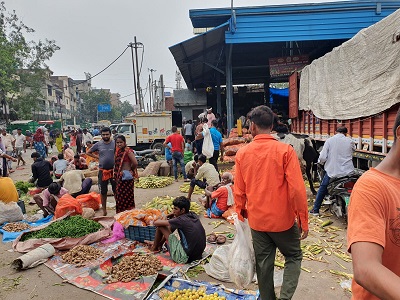New Delhi,(Samajweekly) Fruit and vegetable markets across Delhi have been plagued by late deliveries and rotten products as heavy rain and floods have continued to wreak havoc in the national capital.
Although prices are decreasing at Asia’s largest Azadpur Fruits and Sabji Mandi, rates at local market are spiking.
The main reason behind this, according to the Aadhtis (businessmen), is late delivery and that too of rotten products, which they refer to as “product kala ho gaya”, and a decrease in the number of clients visiting their shops.
According to the Agricultural Produce Market Committee (APMC), as of 10 a.m. on Friday, 1,400 vehicles had entered the Azadpur Mandi, which was slightly lower compared to the past two days.
On Monday, there were 4,100 vehicles, while on Tuesday and Wednesday, there were 4,000.
On Thursday, the number decreased to 3,550 vehicles.
These numbers indicate that around 500 to 600 trucks are arriving late at the Mandi.
The Aadhtis stated that those stuck in rain, floods, or traffic jams are delivering rotten products or products that rot within a few hours, resulting in losses for them.
As a result, prices at the Mandi have decreased, but in the local market, they have increased.
“Nobody is willing to buy our rotting products, and due to the unavailability of vegetables, prices are high in the local market. The end consumers are also suffering,” said a local businessman, Mukesh Sharma.
Sachin Arora of the Joginder Pal & Sons, mentioned that their business was affected by the rain as fewer people were visiting the Azadpur Mandi.
“Roads are closed, and trucks coming from Solan (Himachal Pradesh) are halted at Kundli border and the Bypass crossing. Drivers are unwilling to deliver at APMC due to the hurdles. Tomato rates have decreased from Rs 150 to 120, but the business has been affected. Rates were high because Himachal was completely blocked,” said Arora.
He added that in the local market, prices were high due to low delivery, which is likely to decrease in the future.
Aadhti Joginder Thakur stated that due to the rain, rotten products were being delivered at the APMC, resulting in losses for them.
He mentioned that due to the rain, trucks were stuck in Himachal, but now they were reaching the APMC, and tomato prices were lower compared to two days ago.
Satyam Yadav, who sells onions, stated that due to the rain, the delivery of vegetables was low in Azadpur Mandi, causing an increase in prices.
“Earlier, the price of fine quality onions ranged between Rs 12-15 per kg, but now it has reached Rs 20-25 per kg,” he said.
Manoj Kumar Yadav, another Aadhti, mentioned that the business was completely affected by the rain.
He used to receive deliveries of 50 to 60 trucks, but the number has now reduced to 40, indicating a decrease in sales.
Aadhti Deepak Saini said that due to heavy rain, deliveries were low. He also mentioned that the products were becoming “black” (rotten) due to the rain.
“We are suffering because the products have turned black. Additionally, we are unable to send our products to clients in other states ahead of the rain, which further adds to our suffering,” he said.
Shahbaz Khan, another Aadhti, said that trucks were reaching five to six hours late due to massive traffic jams, and some were stuck at borders, causing them to suffer.
Sharvan Kumar Malik of Sharvan Kumar & Yatin Kumar and Company said that the products he was selling had become black.
“For the last two days, fewer trucks have been arriving, and trucks are halted at the borders. Due to the late delivery, we don’t get the full price. I sell mangoes, apples, and plums. Earlier, the rate for a trio of these fruits was Rs 100 per Nag (boxes), but now it has reached between Rs 150 and 200,” he said.
Baijnath Sharma of AP Produce mentioned that his clients have not been visiting the Mandi for the past two days due to the rainy season, which has impacted his business.
“YMy whole godown is full, but sales are low. I am a wholesaler of coconuts, and while I am receiving the deliveries, the sales are low. This is the lowest market we have seen in the last five years,” he said.









